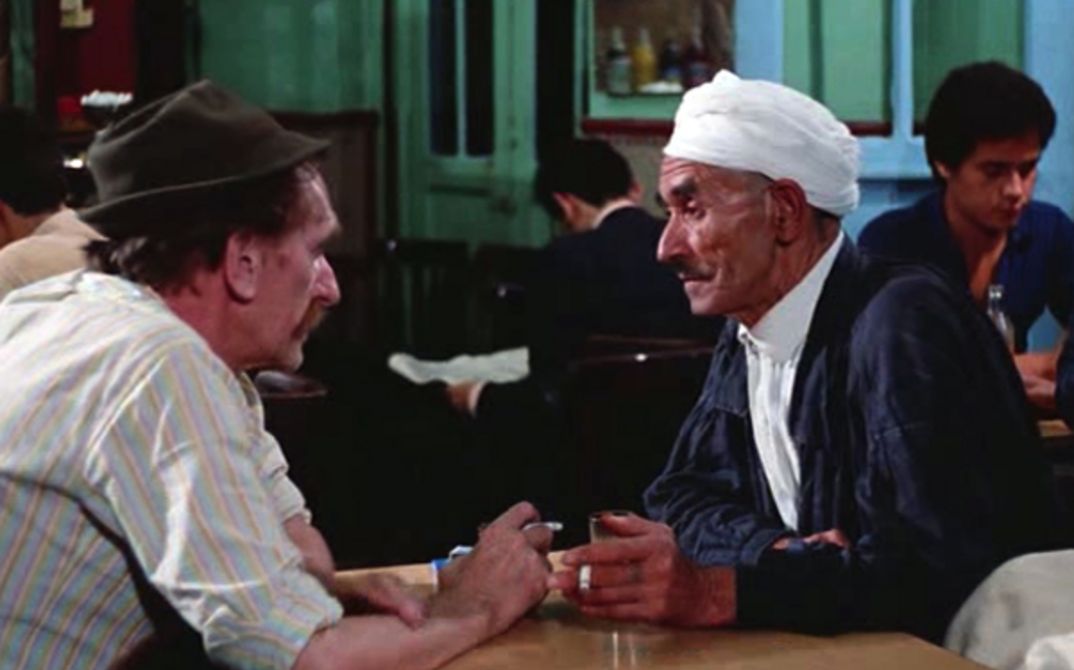Zinet, a child of the Kasbah
As is often the case with masterful artworks, TAHIA YA DIDOU is eerily premonitory. The scene of the public gathering around the military parade is emblematic of post-independence Algeria, and the iron-fisted rule of the military. As for the recurring sequences of children running from the grip of the police, it is chilling to think that these working-class children will grow into young men mobilised by radical Islamist movements, and twenty years later, they will still be on the run, hunted by the police.
Mohamed Zinet was the founder of the Algerian National Theatre; he was a stellar actor, dramaturge, comedian and a prominent figure on the Algerian cultural scene. A child of the Kasbah, he fought in the Algerian War with the National Liberation Army (ALN), and wanted to paint a genuine portrait of his beloved city. ‘Tahia Ya Didou’ is a common greeting in the local dialect of Algiers, which means ‘good day, sir,’ or ‘good day, uncle’. The film was shot in 1969 and 1970, and presumably completed in 1971. Although the film was withdrawn by the authorities, there were occasional screenings at the Cinémathèque d’Algier, and TAHIA YA DIDOU became a cult film.
Mohamed Zinet continued working as an actor; he was cast in LES AJONCS and LES TROIS COUSINS by René Vautier, MONANGAMBE by Sarah Maldoror, LA VIDE DEVANT SOI by Moshe Mizrahi, ROBERT ET ROBERT by Claude Lelouch, to name a few. Zinet died in France in 1995. (Rasha Salti)
The camera wanders through Algier
From the market to the harbour, through the streets, into the cafés: Zinet’s camera wanders through the city, feeling its pulse. Varying camera angles, distances and movements coalesce in flowing observations of Algiers’ residents and their faces, on which the camera repeatedly lingers. Some people are seen again and again, becoming protagonists, for example a group of children pursued by a good-natured police officer; an unusual Swiss man who has just arrived at the airport in shorts; and a crab fisherman without a passport. These sketched portraits are often comical. They capture our attention, and we plunge completely into the movements of the city. (...)
TAHIA YA DIDOU was finished in 1971, when the city’s wounds had not yet healed. The people seem to want to keep the occupation and the war of independence in memory and make them part of their everyday life. TAHIA YA DIDOU simultaneously shows the present and evokes the past, giving the film a timeless dimension expressed in the repeated appearance of the figure of the poet Momo. His words – hymns to the city of Algiers – are not subtitled synchronously, but repeated in French after a delay. In this way, we can open ourselves up entirely to the sonority of Arabic for a moment. Zinet easily connects documentary footage and acted scenes, comedy and tragedy, creating an unusual, extremely vibrant film one immerses oneself in with pleasure. (Marion Pasquier)
Shaping the impossible
Ali Marok (one of the film’s cameramen –Ed.) recalls: ‘Today (...) no one speaks any more about the effort required to make this film. In one scene that takes place near the Emir Abdelkader High School, my daughter – then still small – can be seen as an extra. We worked on the verge of secrecy, without a filming permit. I had to find sources for the film material, which was almost impossible at the time. Not a few cameramen sold the unused remnants from a day of shooting to photo studios… The last sequences of the film were shot under the simplest conditions. At the same time, my employer warned me about my work on Zinet’s film. The impression was that our little production team had come to the attention of obscure forces that wanted to prevent at all costs the production of this little commissioned film. And indeed, throughout the entire production time, there was the danger that the film would be prevented and the project buried forever.’ (...)
Summer and autumn 1970 passed. Ali Marok continues: ‘As if by fortunate coincidence and thanks to the blessings of the gods, Zinet returned to Algiers with a copy of the finished film under his arm (Zinet had edited the film in Paris –Ed.). The mayor of Algiers, Prof. Dr. Mentouri, was overjoyed. Finally the film was finished, finally it could open the new cinema L’Algéria (earlier known as the Le Versailles cinema) and floodlights would illuminate the name of Mohamed Zinet at the entrance to the movie house. With that, the Versailles would be improved and remodelled by a child of the Kasbah – thanks to Zinet!
But the finished film was neither what had been announced nor what was expected. Zinet had turned a short, commissioned film into a full-length feature. A reportage had become a unique feature film.’
TAHIA YA DIDOU is a film of joy that opens itself up to the city’s children, their ball games and their pranks. At the end, it entrusts the microphone to a veiled woman who unashamedly expresses her enthusiasm in the overcrowded tiers of the Annasser Stadium, where the Algériade (a sport competition –Ed.) is being held. One could fill many pages with narratives of everything one finds in the film and with descriptions of the sensitive imaginativeness and the twists and turns – fresh, guileless and mischievous at the same time – that constitute this film. (Abderrahmane Djelfaoui)
